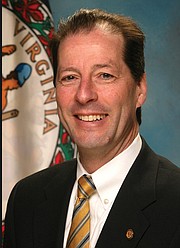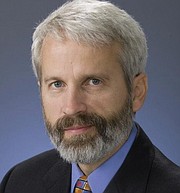City Council appoints leaders of Coliseum advisory commission
Jeremy M. Lazarus | 7/26/2019, 6 a.m.
Two Richmond residents with extensive experience in development have been named to lead an advisory commission to review the $1.4 billion proposal to replace the Richmond Coliseum.
City Council voted to appoint Pierce R. Homer, a former state secretary of transportation for two Virginia governors with a track record of involvement in public and private development projects, and John Gerner, a leisure industry consultant who has worked on international projects, to lead the future nine-member Navy Hill Development Advisory Commission.
City Council named Mr.Homer, who lives in NorthSide, as chairman, and Mr. Gerner, who lives in Church Hill, as vice chair.
The appointments came Monday, during the council’s meeting at which the governing body also approved sweeping changes to zoning in Downtown and North Side and also honored former Commonwealth’s Attorney Michael N. Herring, outgoing Richmond International Airport President and CEO John Mathiasen and volunteers engaged in restoring historic Evergreen Cemetery in the East End.
Mr. Homer and Mr. Gerner, who were not present for the vote, still need to be sworn in to begin their work. Once sworn in, the two would then nominate and send for approval to the council the names of the seven other people to serve on the review panel.
After being seated, the commission would have 90 days to review a new Coliseum proposal after it is submitted to the governing body, though when that is to happen is anyone’s guess.
The council, which usually recesses in August, has scheduled a brief special meeting for Monday, Aug. 5, to allow for introduction of papers. The agenda has not been released, but, at this point, there is no indication that the meeting has been called to allow the mayor to present ordinances on the project.
City Chief Administrative Officer Selena Cuffee-Glenn told the council the massive proposal that Dominion Energy’s chief executive, Thomas F. Farrell II, is pushing remains in negotiations. She said the proposal would not be presented to the council until Mayor Levar M. Stoney is convinced the deal would be “in the best interests of the city.”
Councilwoman Kim B. Gray, 2nd District, noted when she and 8th District Councilwoman Reva Trammell first introduced the commission proposal last November, the main argument against it was that it could delay a quick start to the Coliseum development that supposedly was on a fast track.
Ms. Gray is enthused about the first two appointments to the commission.
“My colleagues deserve praise for selecting two people who have been involved with various projects of similar size and scope, have no known ties to the proposed developers or the development, have not publicly expressed an opinion about the proposal and are willing to delve into the details and provide us with the insight we would need to make an informed decision,” Ms. Gray told the Free Press after the meeting.
Ms. Gray added that she has every expectation that Mr. Homer and Mr. Gerner will select panel members who are “equally independent, knowledgeable and capable of undertaking an objective review.”
Council tentatively selected the two men on July 1 from 24 applicants from diverse backgrounds. Some council members initially proposed appointing attorney Michael J. Schewel, board chair of the nonprofit Better Housing Coalition and a frequent appointee to city boards and commissions involving workforce development and transportation.
However, concern was raised about Mr. Schewel’s neutrality, given that the Coliseum development group is supporting the Better Housing Coalition’s controversial plan to develop new apartments in Jackson Ward.
As outlined by Mayor Stoney last November, the Coliseum replacement plan calls for building a new, larger arena to replace the closed Coliseum and for constructing nearly 3,000 new apartments, two hotels, up to three new office buildings and more than 25 new restaurants and retail stores.
Under the plan, the development would rise largely on city-owned property near City Hall in Downtown, including three parcels south of Broad Street and eight blocks of property between 5th, 10th, Leigh and Marshall streets.
The main target area was once a majority-black neighborhood called Navy Hill that decades ago the city bought for construction of an interstate highway and government buildings, including City Hall, the John Marshall Courts Building, the Public Safety Building and the federal building.
Meanwhile, voters may weigh in on whether they want the project on the Nov. 5 general election ballot. A citizen’s initiative to put an advisory referendum on the ballot is now pending in Richmond Circuit Court.
In other business, the council approved rezoning the Monroe Ward area of Down- town with the aim of promoting construction of taller office and apartment buildings on land now used for surface parking and the Lombardy Street corridor near Virginia Union University to promote more apart- ment, restaurant and retail development.
The council also passed 4th District Councilwoman Kristen N. Larson’s ordinance directing the Stoney administration to provide an annual report on the condition of the city’s streets, roads and bridges by Feb. 1 of each year.
Also approved was a separate resolution from 9th District Councilman Michael J. Jones requesting the administration provide a plan and the projected cost for reinstalling metal detectors at the entrances to City Hall. He initiated the proposal in the wake of the May 31 massacre in Virginia Beach in which a city employee there killed 12 people in the Virginia Beach municipal center.
Metal detectors were in place for several years at Richmond City Hall before being removed during the tenure of former Mayor L. Douglas Wilder.










